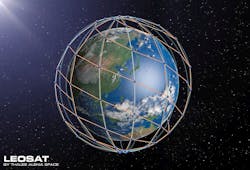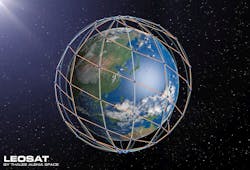LeoSat works with Thales Alenia Space, SJC to develop, launch 108-satellite LEO data network constellation
POMPANO BEACH, Fla. With the ever-growing demand to move large quantities of data quickly and securely around the world, there is an increasing interest in the major performance advantages of satellite communications (SATCOM) networks in low Earth orbit (LEO). LeoSat Enterprises in Pompano Beach, Florida, is launching a constellation of up to 108 LEO communications satellites to meet growing demand for a fast, secure, and wide coverage data network.
SKY Perfect JSAT Corp. (SJC), a satellite operator and provider of TV broadcasting and satellite communications services in Japan, is investing in LeoSat and reportedly the first Asian satellite operator to pursue the development of LEO capabilities.
LeoSat’s new LEO network architecture uses inter-satellite laser links to create an optical backbone in space, providing fiber-like, low-latency, and gigabit per second (gbps) data delivery. SJC’s investment in LeoSat enables the company to pursue new business opportunities in the data and mobility markets, such as telecommunications, multinational enterprise, maritime, and government services by providing previously unavailable levels of network performance combined with worldwide reach, as well as to further study additional applications of LEO communications in pursuit of its global ambitions.
The unique features of LeoSat’s system can be used for a number of applications, such as to provide 4G and 5G satellite backhaul for the cellular industry, give banks secured networks with their foreign offices, provide enormous uploading bandwidth required for energy and maritime operations, deliver critical back up for emergency communications, and enable Internet access and connectivity for remote communities.
“We are thrilled that an established company such as SJC, with a reputation for foresight and diligence in the development of its technical capabilities and business relationships has chosen to partner with LeoSat,” says LeoSat CEO Mark Rigolle. “LeoSat’s LEO constellation comes with a key set of attributes which are already receiving significant attention from both the commercial and government sectors, including lower latencies, better data rates, and increased security and resilience. With the added-value of support from SJC, we definitely see LeoSat’s faster than fiber, ultra-secure and highly reliable global data solution as a game-changer.”
“With the current and future growth of data traffic and the unique nature of the LeoSat system and its focus on the business market, we believe there will be very strong demand for the LeoSat solution,” says Koki Koyama, Senior Managing Executive Officer of SJC. “This investment and development partnership with LeoSat will allow SJC to expand and complement our existing GEO satellite services and beyond by enabling us to respond to customer needs which are not being met by today’s technology.”
LeoSat is currently working with Thales Alenia Space, a company with unmatched expertise in designing and manufacturing LEO satellites, to finalize the manufacturing plan, paving the way for the production and deployment of the entire constellation.
LeoSat Enterprises was established to leverage the latest developments in satellite communications technologies to develop and launch a new low-earth-orbit satellite constellation which will provide the first commercially available, business grade, extremely high-speed and secure data service worldwide.
With up to 108 low-earth-orbit communications satellites in the constellation LeoSat is the first company to have all the High Throughput Satellites (HTS) in the constellation interconnected through laser links, creating an optical backbone in space which is about 1.5 times faster than terrestrial fiber backbones and without the need for any terrestrial touchpoints. This unique set of features enables LeoSat to provide instant infrastructure from anywhere to everywhere which is fast, secure and reliable.
Based in Washington DC, LeoSat is currently working with Thales Alenia Space for the low-earth-orbit constellation of Ka-band communications satellites. Once operational, the constellation will provide high-speed, low-latency and highly secure communications and bandwidth for business operations in the telecom backhaul, Energy, Maritime, Government, and international business markets. Launch of the constellation is expected in 2019.
SKY Perfect JSAT provides satellite communications for broadcasting and communications. It is Asia’s largest satellite operator with a fleet of 18 satellites, and Japan’s only provider of both multi-channel pay TV broadcasting and satellite communications services. SKY Perfect JSAT delivers a broad range of entertainment through the SKY PerfectTV! Platform, with a total of 3 million subscribers. In addition, SKY Perfect JSAT’s satellite communication services, which cover Japan and the rest of Asia, as well as Russia, the Middle East, Hawaii, and North America, play a vital role in supporting safety, security, and convenience for society as a whole, officials say.
Search the Aerospace & Defense Buyer's Guide
The go-to resource for Intelligent Aerospace technology news & information:
Covering key topics
Across all market segments
Subscribe to the free Intelligent Inbox e-newsletter
Subscribe to receive all the latest aerospace technology news & information, delivered directly to your e-mail inbox twice a week (Tuesdays and Thursdays). Sign upfor your free subscription to the Intelligent Inbox e-newsletter at http://www.intelligent-aerospace.com/subscribe.html.
Connect on social media
Keep pace with aerospace innovation and opportunities via your favorite social media channels. Connect with Intelligent Aerospace on Twitter (@IntelligentAero), LinkedIn,Google+, and Instagram.


